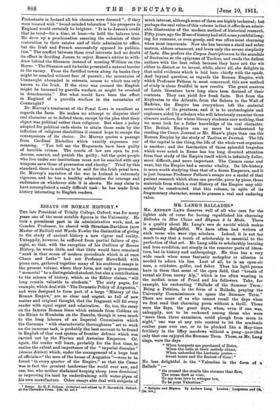ESSAYS ON ROMAN HISTORY.*
THE late President of Trinity College, Oxford, was for many years one of the most notable figures in the University. He took a prominent part in its administrative work, and, as Camden Professor, he shared with Strachan-Davidson (now Master of Balliol) and Warde Fowler the distinction of giving to the study of ancient history a new vigour and reality. Unhappily, however, be suffered from partial failure of eye- sight, so that, with the exception of his Outlines of Roman History, he wrote little, and that little would have remained " sunk in that ocean of modern periodicals which is at once Chaos and Lethe " had not Professor Haverfield, with pious care, gathered together many of his scattered essays in the present volume, where they form, not only a permanent 4‘ memorial "to a distinguished student, but also a contribution to the science of history, which, as the Editor claims, "will long remain valuable to students." The sixty pages, for -example, which deal with "The Domestic Policy of Augustus," and were designed to form part of a large "History of the Roman Empire," are So clear and cogent, so full of new matter and original thought, that the fragment will fill every reader with equal regret and admiration. So, too, the essay on the famous Roman limes which extends from Coblenz on the Rhine to Hienheim on the Danube, though it owes much to the long labours of an Imperial Commission which the Germans "with characteristic thoroughness" set to work on the immense task, is probably the best account to be found in English of that vast system of frontier defence which was .carried out by the Flavian and Antonine Emperors. Or, again, the reader will learn, probably for the first time, to realize the extent and importance of the "imperial domains" (damus divina,) which, under the management of a huge host of officials—" the men of the house of Augustus "—were to be found "in every quarter of the Empire," so that the Ca3sar was in fact the greatest landowner the world ever saw, and one, too, who neither disdained keeping sheep (ores dominiez) or improving his land by underdraining with water-pipes of his own manufacture. Other essays also deal with subjects of • Essays. By H. F. Pelliam. Collected and edited by F. Ilarerfleld. Oxford: at the attend:on-Press. [10a. 6d. nett mach interest, although some of them are highly technical; but perhaps the real value of this volume is that it affords an admir- able illustration of the modern method of historical research. Fifty years ago the Mused history had still some youthfullong- ing for romance, or even gossip, and was often most charming when most inaccurate. Now she has become a staid and sober matron, abhors ornament, and loves only the severe simplicity of facts. She prefers the Corpus Inseriptionum to the scandals of Suetonius er the epigrams of Tacitus, and reads the dullest authors with the best relish because they have not the wit either to distort or to invent, while, above all, she delights in that solid evidence which is laid bare chiefly with the spade. And beyond question, as regards the Roman Empire, with which Professor Pelham is most concerned, this new method of study is alone fruitful in new results. The great masters of Latin literature have long since been drained of their contents. They can yield few fresh facts. But from the Euphrates to the Atlantic, from the Sahara to the Wall of Hadrian, the Empire has everywhere left the material memorials of its greatness, and it is to archmologists and explorers, aided by scholars who will laboriously examine those obscure authors, for whom literary students care nothing, that we must look for a fuller knowledge of its real character. The British Empire can no more be understood by reading the Court Journal or Mr. Shaw's playa than can the Roman Empire by the study of Tacitue or Juvenal. The life of the capital is one thing, the life of the whole vast organism is another; and the fascination of those splendid tragedies which were acted in Rome has too long diverted attention from that study of the Empire itself which is infinitely duller, more difficult, and more important. The Cmsars came and went, but the Empire had a secular vitality. Its life-history is more worth studying than that of a dozen Emperors, and it is just because Professor Pelham's essays are a model of that patient research which alone can provide, piece by piece, those materials from which a real History of the Empire may ulti- mately be constructed that this volume, in spite of its fragmentary character, seems to possess a real and enduring value.










































 Previous page
Previous page